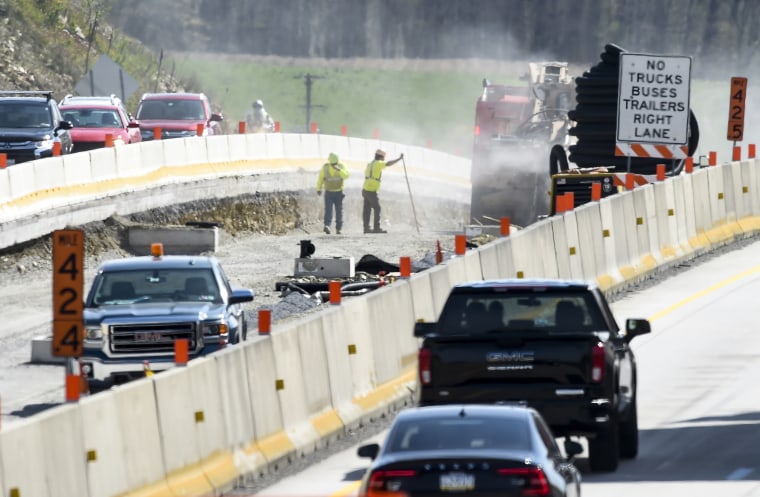WASHINGTON — The infrastructure deal announced on Thursday represents the best-case scenario for President Biden’s domestic agenda — the possibility of a long-awaited bipartisan accomplishment, plus the ability to still pass his other tax, climate and care-giving priorities through a separate reconciliation bill.
But that’s if it all works.
The way forward is a delicate dance that requires passing a bipartisan infrastructure bill (which won’t be easy) at the same time as Democrats craft a reconciliation bill (which is another challenge).
And here are three different ways Biden’s infrastructure/jobs/tax/safety net hopes could get derailed.
Derailment #1: Conservatives revolt
Already, Republicans like Senate Minority Leader Mitch McConnell and Sen. Lindsey Graham, R-S.C., are balking at the Democratic/Biden demand linking the bipartisan infrastructure deal with the reconciliation package — since the reconciliation vehicle contains tax and climate provisions they don’t want.
Prior to yesterday, grassroots conservatives had shown little interest in infrastructure talks, preferring instead culture war issues and refighting Trump's 2020 election loss. And that's freed Republicans to negotiate with the White House without fear of backlash from the base.
But does the possibility of twin Biden victories — on bipartisanship and other spending/tax priorities – change that conservative focus?
Derailment #2: The Democratic consensus unravels
So far, centrist Sens. Joe Manchin, D-W.V., and Kyrsten Sinema, D-Ariz., sound amenable to Democratic plans to pursue a second bill without Republican votes, which was always a critical prerequisite to passing anything. "Reconciliation is inevitable," Manchin told NBC's Frank Thorp. "I will work with anyone to get things done," Sinema told NBC's Sahil Kapur. "I've already spoken with the President and Leader Schumer about their thoughts on a two-phase process. And like always, I am open to finding a path forward."
All of this is raising hopes in the party that they're unified and ready to roll on the next steps.
But will all Democrats — from Manchin to Bernie Sanders — agree on the details for what’s in the reconciliation package, as well as the budget resolution to start the process?
And the other question: If Republicans threaten to back out of the deal over process complaints, will Manchin and Sinema stay in the Democratic fold and pass everything with 50 votes?
Derailment #3: The great unknown
Let's be blunt: Democrats are one vote away from their Senate majority — and with it their ability to pass anything without Republican votes — disappearing. Every day they go without a bill is a risk and this process could easily run into September, October, or beyond if a bill proves difficult to hammer out.
As Infrastructure Week turns into Infrastructure Summer and Infrastructure Fall, do Democrats still keep their fragile majorities?
That might be the biggest question of all.
Tweet of the day
Data Download: The numbers you need to know today
Over 750: The number of unmarked graves found near a former residential school for Indigenous children in Canada
11: The number of nonfederal law enforcement officers, including Derek Chauvin, convicted of murder resulting from an on-duty incident since 2005.
21.7 years: The average punishment among the nine officers who have been sentenced so far.
33,734,705: The number of confirmed cases of coronavirus in the United States, per the most recent data from NBC News and health officials. (That’s 10,672 more than yesterday morning.)
606,668: The number of deaths in the United States from the virus so far, per the most recent data from NBC News. (That’s 313 more than yesterday morning.)
320,687,205: The number of vaccine doses administered in the U.S.
41.9 percent: The share of all Americans who are fully vaccinated, per NBC News.
56.2 percent: The share of all American adults over 18 who are fully vaccinated, per CDC.
On the border
Vice President Kamala Harris today heads to El Paso, Texas, where she will tour a Border Patrol station, visit with faith-based advocates and later delivers remarks.
Meanwhile, President Biden today gives a speech marking LGBTQ+ Pride Month before meeting with Afghanistan’s president at the White House.
Recall is on in California
While the recall election for California Gov. Gavin Newsom has been apparent for months, it became official earlier this week.
“Just 43 signatures were withdrawn, leaving 1,719,900 verified signatures to initiate the recall election, the California Secretary of State's Office said in a statement. Secretary of State Shirley N. Weber on Wednesday notified the state finance department of the result,” per NBC News.
The next steps: The state’s Department of Finance will now estimate the cost of the recall, and then the lieutenant governor will set the election date.
ICYMI: What else is happening in the world
Here’s what we know about the bipartisan infrastructure deal.
Negotiations on police reform are now expected to continue into July.
The Biden administration is helping to evacuate Afghans who assisted the U.S. military and are now threatened by the Taliban.
Rudy Giuliani has been suspended from practicing law in New York.
A judge will allow a review of ballots in Georgia to go forward.
Former president Trump was far sicker with Covid-19 than previously known, a new book says.
Mike Pence went further than before in a speech last night to defend his actions on January 6.




